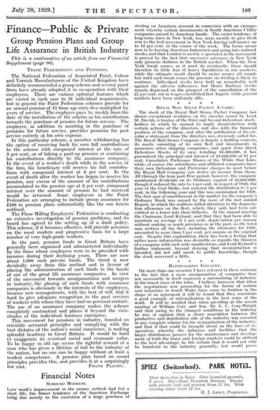* * ROYAL MAIL STEAM PACKET AFFAIRS.
The stock of the Royal Mail Steam Packet Company has
shown exceptional weakness on the circular issued by Lord St. Davids, a trustee of the First and Second Debenture stock- holders in which he seemed to imply dissatisfaction with certain actions- of the directors, and also with the financial position of the company, and after the publication of his cir- cular a statement from the directors was obviously called for. The Royal Mail Steam Company is largely a holding concern, its assets consisting_ of its own fleet and investments in numerous other shipping companies, and apart from direct Debenture Stocks of its own, totalling £6,500,000, it has guaranteed the principal and interest of £5,000,000 of 64 per cent. Cumulative Preference Shares of the White Star Line, while, of course, the subsidiaries and affiliated companies have their own Debenture and Preference charges to meet before the Royal Mail Company can derive an income from them. All through the lean post-War period, however, the company maintained dividends on its Ordinary capital of £5,000,000, though it reduced the rate to 4 per cent. in respect of 1926, the year of the Coal Strike, but restored the distribution to 5 per cent. in the following year and this was maintained for 1928. The first sign of unsettlement in the market for the company's Ordinary Stock was caused by the issue of the last annual Report, in which the auditors called attention to the deprecia- tion allowance on the fleet, which, they said, had been cal- culated at a lower rate than hitherto. At the annual meeting the Chairman, Lord Kylsant, said that they had been able to maintain an average of 5 per cent. depredation per annum without making so much provision as in the past, as the total sum written off the fleet, including the allowance for 1928, amounted to more than 5 per cent. per annum on the original cost. Despite this explanation, there has been a feeling that rather more information was desirable as regards the finances of a company with such wide ramifications, and Lord Kylsant's further statement, beyond denying that reconstruction is intended, did not add much to public knowledge, though the stock recovered a little.
















































 Previous page
Previous page